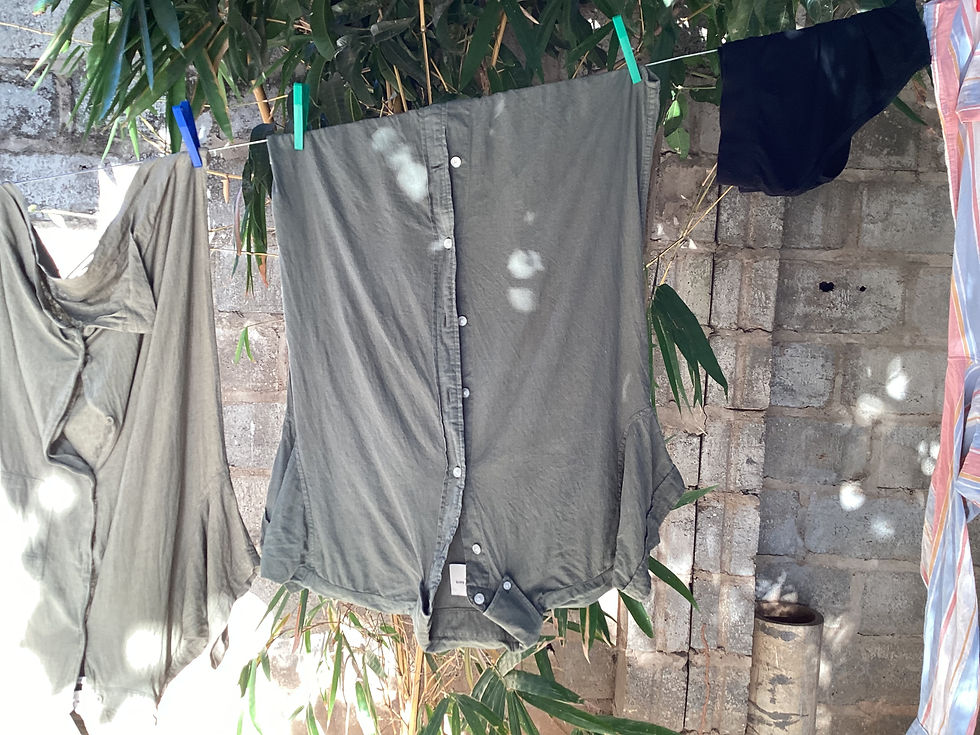ZAMBIA LETTERS, 26
- Ludvig Uhlbors
- 24 juli 2025
- 4 min läsning
Uppdaterat: 25 juli 2025

16/07/2025
On the way out, I check the clock. Lunchtime. I could use the rest of the day for more research, but I have experienced enough. I have to pull back, otherwise it will not be constructive. I need to collect my thoughts and my emotions. In addition, my chest is tight. I am in pain and I feel exhausted. We drop Mr Mumba off at a bus station and I thank him for his help. The driver takes me to Kitwe, where I will spend the night. I check in, call another Yango. Off to the bus station and then buy a ticket to Kabwe for the next morning. I go back, order dinner at the hotel restaurant.
It takes four hours for my food to arrive and when it does, there is very little to eat. I tip generously and ask the receptionist to arrange an early taxi for the morning. I call Hanna and Irpa and tell them about my experiences. Hanna worries about my health, but I tell her that I am fine.
Before I go to bed, I wash all my expedition clothes thoroughly in the sink, including my cap. I consider throwing them away but realize that I will need them in Kabwe. I hang them to dry in the closet.
16/07/2025
Hannas smartphone is lying on the floor. I have connected it with the electrical outlet again. It needs to be recharged every evening and as the power only comes on efter eight a clock, I am always running a little low on batteries at the end of the day.
I have discovered how tempting it is to think in terms of images and films when you have a smart phone. If your are traveling, as I am, meeting people, listening to their stories, visiting sites (very often visually striking environments); then a smartphone is a handy tool.
Given that the cameras are so well developed today, and that you so easily can record voices, and that social media is creating such a pressure on us to post and repost material, then it is no surprise that we often choose to tell stories through recordings and photos. It just doesn’t make any sense to do a written traveling journal today. The very idea of doing a documentary in writing, instead of images, doesn’t even materialize. When you have a smartphone, or a more well developed camera for that matter; you will invariably find yourself using it.
You don´t go and meet suffering people, folks who are living in poverty and who are letting you into their homes; showing you cracks in the walls, signs of decay and corrosion, and write about it. Not when you can film it or take photos. You don’t describe the black mountain in words, the dust that rises on the red dirt roads, the men who are sitting crosslegged in the junkyard hammering away on big rocks, the goats that are staggering around in mountains of plastic and human waste, the old miner who is sharing his story but has to stop every now and then to cough up his lungs or the kind but worried manager Salim who is peering out through his thick glasses and who makes a sudden decision to trust you and to be benevolent for no other reason then kindness.
16/07/2025
Musakalu had asked me who I am. Why I am here and what is the purpose of my visit?
I answered that I work with theater. A few years ago I carried out a project that involved studying the Norwegian philosopher Arne Næss and his environmental philosophy. As a part of my research, I travelled to his cabin, Tvergastein, located high in the Norwegian mountains. Arne lived 13 years of his life there and it was where he wrote most of his philosophy. I wanted to try living there, together with others, to get a physical understanding of his thinking. At that time, I had no relationship to the climate issue, but the experience changed me and when I came down from the mountain, I felt that I needed to work with these issues. More specifically with the question of our relationship to nature, our own bodies and the ecosystems. So I look for situations and conflicts where exploitation is taking place and where the question of our impact on ecosystems becomes visible. I then try to find ways to discuss these issues. How does exploitation affect people? What social and health problems does it create and how does the economy and violence around exploitation play out?
That is an interesting word, he said, exploitation. What does it mean to you?
It is taking place in relation to our bodies, I answered. It is something we do to each other, but it is also economic. And in relation to nature. It happens on many levels, they interact, create suffering.
Thank you for sharing your story, he said. And for telling me your background. What you are doing is very important. Everywhere. It really is.
And then: You are doing God's work.
I tasted it. The feeling of maybe working on behalf of an Abrahamitic deity, to be executing his divine will, was empowering. Especially there and then, sitting in front of Musakalu in his house, in that hell they call Kankoyo. At the same time, how are Christian believes motivating all this?
THE JUDGE
How was your work with the gas organized?
DEFENDANT 17
The prisoners had to hang up their clothes in the chamber. Then I, together with another disinfectant, threw the gas in. After 24 hours we took the things out again, new clothes were hung up and that's how it went.




Kommentarer